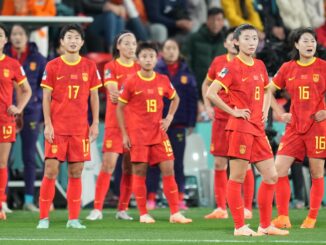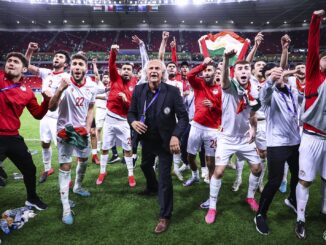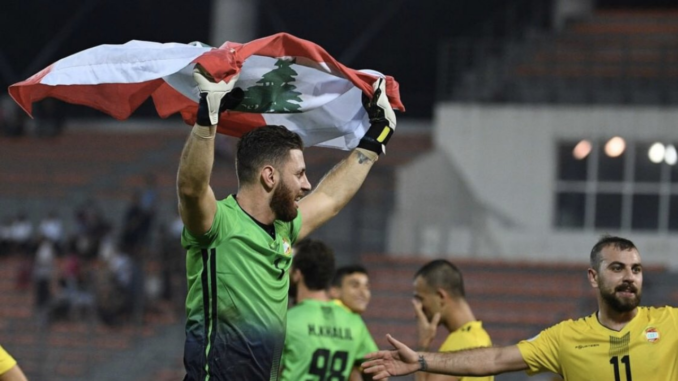
With the AFC Cup in the bag, Mahdi Khalil has set his sights on the 2022 FIFA World Cup qualifiers and his next chapter.
When Mahdi Khalil was called up to the podium to accept the 2019 AFC Cup MVP award, he thought he had misheard the speaker.
“When they told me that I won it, I thought it was for being the best goalkeeper in the tournament,” he said.
But no such accolade exists. Instead, Khalil was being officially recognised as the best player in the tournament.
He’s the first goalkeeper to win the MVP award.
“I was really surprised,” Khalil said. “When you have strikers or midfielders, they do fancy stuff and people like to see that more. They also have a greater chance of winning such awards.”
Khalil credits his determination and statistics as the reasons behind his successful campaign. He started all 11 of Al Ahed’s AFC Cup games this year, and he kept a clean sheet in nine of them. He only conceded three goals; all in the group stage.
“I worked hard for it,” he said. “I’m a guy that always had a big passion for the game, so I’m thankful for the award.”
Of course, being MVP would not have mattered had Al Ahed not finished as champions.
“Winning individual awards is good, but at the end of the day, we play as a team and you want to win titles with teams,” Khalil said.
The Yellow Wall have been one of the AFC Cup’s top teams for the past half-decade or so. They’ve qualified for the tournament in three of the last four seasons, and they’ve accumulated a total record of 17-9-4 (wins-draws-losses) over that period. Each of their last two losses came against former champions Al-Quwa Al-Jawiya, and they’ve only lost once in the competition’s last two editions combined.
This season, despite seeing their top scorer, Mohamad Kdouh, leave on loan following the group stage, and despite scoring just three goals in five knockout games (including the final), Al Ahed still maintained an unbeaten 7-4-0 record.
Given the squad’s recent history of success, Khalil is not surprised by his side’s dominance.
“The players already had a winning mentality through the domestic competitions; we won the league three times in a row and the [Lebanese FA Cup] two times in a row,” he said. “So they have that winning spirit, that winning mentality.”
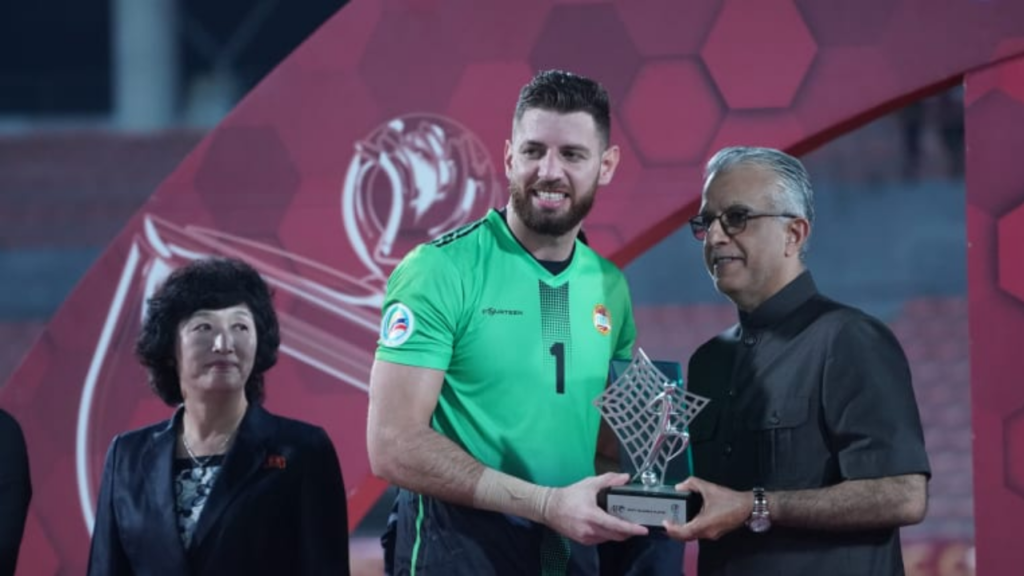
He also singled out the work done by head coach Bassem Marmar, as well as the assistance of an unnamed technical coach which Al Ahed brought in following the group stage.
“The coach [Bassem Marmar] knew how to motivate us, knew how to keep us ready for each game,” Khalil said. “But I think the technical coach, when he came, he helped us see our weak and strong points. He would call each player and show him the player that he would face, and his strengths and weaknesses. So that helped us.”
After falling to the eventual champions in both the 2016 and 2018 editions of the AFC Cup, it was nice for Al Ahed to finally taste continental success for a change.
“It wasn’t easy, but it’s a dream that came true for all of the players,” Khalil said.
Given Mahdi Khalil’s successes in 2019 – the Lebanese domestic double and an AFC Cup championship – it’s hard to argue against this year being the best of Khalil’s career. But it didn’t start off that way.
On January 19, the Cedars faced off against North Korea in the AFC Asian Cup. It was the final group game for Lebanon, who had previously lost to Qatar and Saudi Arabia. They had no chance of qualifying to the knockout stage as one of Group E’s top two teams, but they still had an opportunity at qualifying as one of the tournament’s top third-placed teams. All they had to do was beat North Korea by a large margin.
But in the ninth minute, Lebanon went down 0-1.
The North Koreans had won a free kick about 30 yards away from Khalil’s goal. Pak Kwang-Ryong stepped up to take it, and he struck a relatively tame shot to Khalil’s left side. But Khalil, caught by the ball’s bounce, couldn’t control it properly, and the shot slipped under his body.
As the Chollima celebrated, Khalil could only look up at the stars.
“Playing in a big tournament, all eyes are on you, the pressure is on you, and something like that happens? It sucked,” he said.
Lebanon’s attackers would rally back to win the game 4-1, but it was not enough. The Cedars went out on disciplinary points after tying with Vietnam on points and goal differential for the final third-place qualification spot.
Had Khalil not allowed that free kick to slip underneath him, Lebanon would’ve qualified to the Asian Cup knockout rounds for the first time ever.
“When that happened, it was the worst feeling in my life,” he said.
Despite the initial disappointment he felt, Khalil decided that he wasn’t going to let the mistake consume him. He was determined to show that that error was just a fluke.
“When I came back to Lebanon, I put the mistake in the past and I said, ‘I want to do something about it,’” he said.
And something he did. In his first game back for Al Ahed, he saved a penalty to preserve a close, 1-0 win for his club. A few months later, he backstopped the Yellow Wall to their second-straight league and cup double and earned a spot in the Lebanese Premier League’s Team of the Season.
Khalil credits his strong mentality for how well he rebounded.
“When you are a goalkeeper, you have to be very mentally strong,” he said. “Mistakes happen, but you have to stand up on your feet and move on. And I moved on. I let it go, and I moved on.”
Moving on has been the theme of Khalil’s career. As a child, when he struggled to play well as a defender, he moved to the goalkeeper position. Then, after a season with Sierra Leone-based club FC Johansen, Khalil moved to Sweden to gain experience in a more enticing football setting. And a year after winning the Lebanese Premier League for the first time with Safa SC in 2016, Khalil moved to Al Ahed to pursue more silverware.
Khalil believes that moving on is the key to being a successful footballer.
“This is football; you can’t just think about today or yesterday,” he said. “You have to think about tomorrow and the future; what you want to be and what you want to become.”
With the AFC Cup in the bag, moving on is back on Khalil’s mind. He believes that now is the perfect time for him to test European waters again.
“Now I’m 28. Maybe I’ll have, let’s say, seven years more to play,” he said. “If I go abroad and I play for three or four years, it would be great for my career. I think I would have made a fantastic career for myself.”
He also fears that staying put in Lebanon will result in a dip in his performances.
“If I stay in Lebanon, my performance will go down because I won’t have the same motivation I had these past three, four years,” Khalil said. “It’s difficult to keep this momentum, especially with the mentality of the Lebanese players; how they train, how they work. It’s very difficult to keep in form.
“I need a new challenge. I need a new experience.”
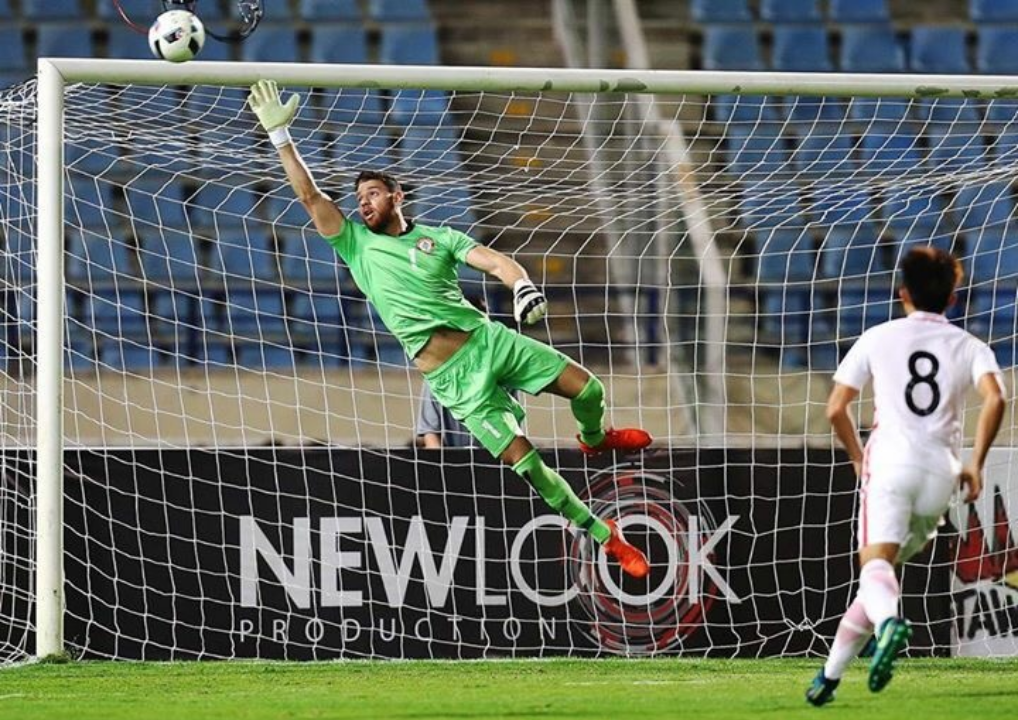
But leaving won’t be easy, and Khalil knows it. It’s rare for a Lebanese player to leave the country and join a European club, no matter how successful the player in question was.
Why is this the case? Part of it likely has to do with the average European not watching (or even having access to) Lebanese football. But according to Khalil, the blame also falls on the front office figures of Lebanese football.
“In Lebanon, in general, they don’t have respect for football players,” Khalil said. “Moving out from Lebanon is very difficult, with the mentality of the management, of the federation here. For players to move out of Lebanon, it’s very difficult.”
Khalil blames the clubs for being stingy with players. He singled out ten-year contracts clubs would sign players to in the past, as well as the very expensive transfer fees teams would put on players when a foreign club comes knocking.
He calls how Lebanese clubs deal with footballers “strange” and accused them of not doing business in football.
“In Sierra Leone, when you’re in a club, if another club wants to buy you, they sell you, they let you go, you see your future,” Khalil said. “But in Lebanon, no, they hold onto you. Even if you want to move from a Lebanese club to another, it’s very difficult.”
Khalil cites this reluctance to send Lebanese players abroad as the reason why Lebanon, despite the rises it has made recently – qualifying to the Asian Cup as a non-host for the first time ever, going on a national team-record 15-game unbeaten streak – has not been able to reach the ranks of Asia’s giants.
“If you see the top countries – Qatar, Saudi Arabia, South Korea, China, Japan – all of these countries have players playing out of their leagues,” he said. “Even though our national team also has some foreigners, but they were born there and they’re playing there.
“But for a Lebanese player to move from Lebanon and go to Europe? Only Roda and [Youssef Mohamad], and these are exceptional players. Since then, no one has left the country and gone to Europe.”
Only by letting Lebanese players move outside of the league, particularly to European clubs, will the football in Lebanon truly improve, according to Khalil.
“They need to let Lebanese players go out. They need to let Lebanese players get exposure,” he said. “The players that have a good mentality and talent, if they go out and improve their talent, they will do something for themselves and for the country. The national team will be stronger.”
For now, Mahdi Khalil and his teammates are focused on Lebanon’s upcoming 2022 FIFA World Cup qualifiers.
“Everybody is positive,” he said. “In training, everybody is in high spirits, and it feels like we want to do something special for the national team and for the country also.”
The Cedars played South Korea to a scoreless draw on November 14; nearly eight years to the day since Lebanon’s famous 2014 World Cup qualifying win over the same Taeguk Warriors in 2011. They’ll welcome North Korea to the country on November 19.
Khalil holds special memories against both of those opponents. He pulled off his favourite save against South Korea in a World Cup qualifier in 2016.
“It was a shot inside of the box,” he said. “It was, I think, a very good save – fast reflexes. I think it was one of the best saves I’ve made.”
A year later, he was part of the Lebanese team that defeated North Korea in Beirut, securing their qualification to the 2019 Asian Cup.
“That was a great feeling,” he said. “I don’t know how to describe it, actually. You know those feelings, they’re from the inside. You can’t explain it.
“It’s always nice to achieve goals like that because it’s something every player dreams of since he was a kid.”
Advancing to the final round of World Cup qualifying (as well as the 2023 AFC Asian Cup), will not be easy. Just two points separate South Korea, who sit atop Group H, from Turkmenistan, who are placed fourth from five teams.
Lebanon sits in the middle of that pack. They’ve accumulated seven points and are only in second place due to their superior goal differential over North Korea. With only the top two teams having a shot at advancing to the final qualifying round, Tuesday’s game between Lebanon and North Korea could have big implications on the standings.
Does the pressure worry Khalil? Not in the slightest.
“They have good players that play in good leagues? OK. But we also have talented players with strong mentalities,” he said. “We’ll play and fight, and nothing is impossible.”
Lebanon’s capital, Beirut, will host both matches. It’s a city Lebanon has not lost in since 2013. They’ve gone unbeaten in ten-straight games in the capital since their 4-1 loss to Iran six years ago.
Khalil hopes Lebanon’s good home record will unnerve its opponents.
“It’s very tough for any club or country that comes to play in the Camille Chamoun Sports City Stadium,” he said.
Unfortunately, no fans were permitted inside of Camille Chamoun Sports City Stadium when Lebanon hosted South Korea. This is due to the ongoing protests in the country. Whether the stadium blockade will also be imposed for next week’s North Korea game remains to be seen.
Regardless of the stadium blockade, Khalil knows that millions of Lebanese fans watched the game on TVs in Lebanon and across the world. He hopes that, by qualifying to the next round of World Cup qualifiers, the current crop of national team players can bring the same joy that the likes of Roda Antar, Youssef Mohamad, and Ziad Al-Samad brought to the nation in 2011.
“When we won [against South Korea in the 2014 World Cup qualifiers], did you see how Lebanon was happy? Not only the national team was happy, but the whole country was happy because they did something exceptional,” he said.
“So hopefully we can achieve our goal because these things make people happy.


